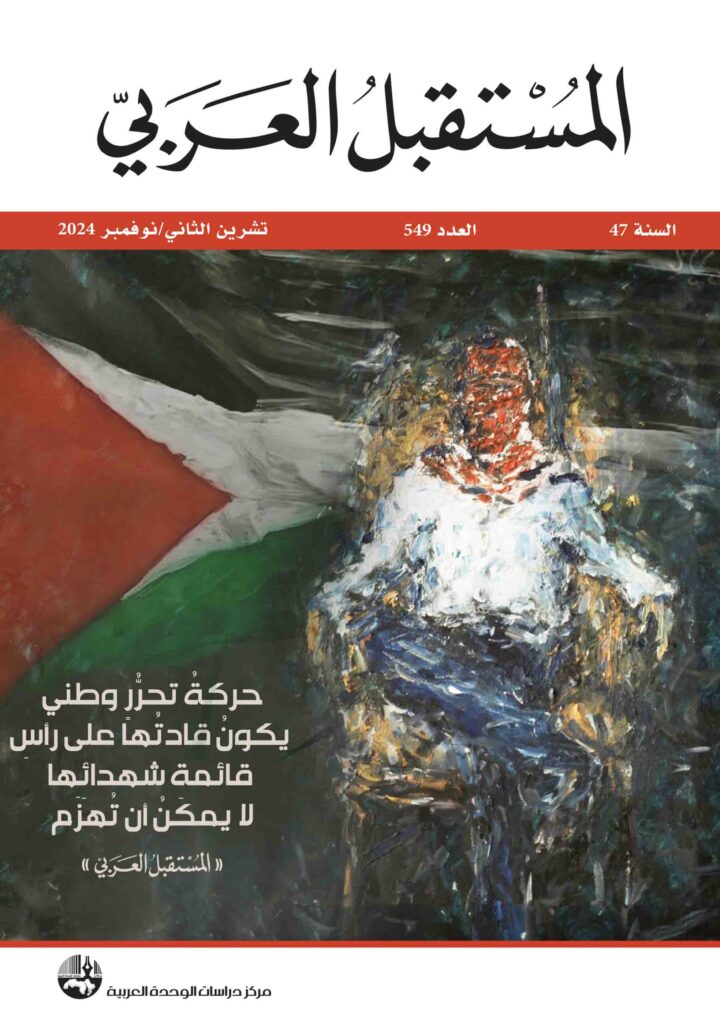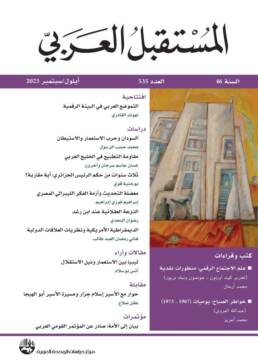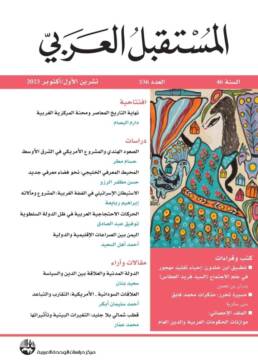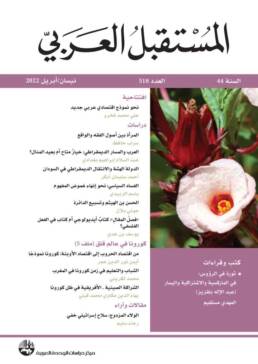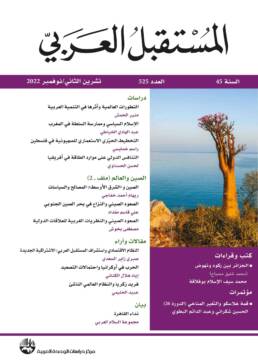Abstract
⬛ Editorial
⬜
Towards frustration a fifth attempt to change the region
Wahid Abdel Majead 7
⬛
Al-Aqsa Flood and the Course of the Palestinian Cause
(File – 9)
⬜ The Crisis of Palestine from the 1993 Oslo Accords to
October 7, 2023 Attacks Boubaker Boukhresa 11
The nature of the Palestinian-Israeli conflict is often misunderstood and misinterpreted. As the destructive genocidal war in Gaza approaches the end of its first year, it is essential to analyze the situation taking into account the historical, conceptual, and field realities of this war and the Palestinian-Israeli conflict in general. This article outlines the key elements of the conflict, its beginning, passing through the 1993 Oslo Agreement, to the Al-Aqsa Flood operation on October 7, 2023, which was succeeded by an ongoing genocide that continues to this day, with the number of Palestinian deaths exceeding forty thousand. So, what are the key dates and elements in this conflict? What is the nature of this conflict? And why did the October 7, 2023 operation surprise us?
Keywords: Palestinian-Israeli conflict, Nakba, colonialism, hegemony, Hamas, genocide.
⬛ Feminism Amidst the Genocide in Gaza Nahwande Al-Qadri Issa 28
In light of the genocide carried out by the Israeli occupation against the besieged Gaza Strip, and considering the massacres inflicted upon women and children, we question the state of feminism and the shortcomings of Arab feminist movements regarding women’s issues, including gender approaches, and the extent to which they have contributed to perpetuating hegemony. This is aimed at establishing an alternative intellectual direction rooted in our reality. To answer these questions, it is essential to examine the symbolism of the female presence associated with the genocide, in relation to the post-colonial neoliberal context, accompanied by a series of transformations that have profoundly affected human life, with the goal of diagnosing the ailments resulting from hegemony in its subtle and overt forms.
Keywords: Genocide, Israeli Occupation, Besieged Gaza, Women, Feminist Approaches, Post-Colonialism, Neoliberalism, Hegemony, Hyper-Modernity, Individualism.
⬛ In the Wake of the Al-Aqsa Flood: The Zionist Plan in Gaza and
Means of Resistance Mohamed Abdel Hafiz Al-Sheikh 46
This research debates a significant matter facing the Palestinian cause, one that is related to Zionist plans in the Gaza Strip following the Al-Aqsa Flood operation. A plan aiming to benefit Zionist strategic ambitions by severing the connections between northern and southern Gaza, compelling Palestinians to evacuate their homes towards the Egyptian border at Rafah, ultimately leading to their displacement through siege, bombardment, intimidation, and terror. The plan aims to empty the entire Gaza Strip of its inhabitants, prompting concerned parties to adopt an urgent and immediate proposal for a vision of resistance, especially in Palestine and regional liberation Arab movements.
Keywords: Al-Aqsa Flood, Zionist Project, Evacuating Gaza, Forced Displacement.
⬛ Studies
⬜ Political Culture in the Colonial Context of Malek Bennabi and
Frantz Fanon Nour Eddine Thanyo 61
This study addresses the topic of political culture during a colonial moment as explored by Malek Bennabi and Frantz Fanon, highlighting both their differences and intersections. Colonialism is a persistent tendency to reveal the conflicts, differences, and contradictions inherent in Algeria’s history. Both scholars perceive culture and politics as unison, forming a single concept referred to as political culture, which draws its conceptual and procedural strengths from culture practical and instrumental power from politics. The situation created by colonialism is both the backwardness and advancement of Algeria simultaneously, as it encompasses both Muslim and French populations. The challenge lies in how to coexist between these groups, a question that Malek Bennabi sought to address.
Keywords: Political Culture, Colonial Context, Malek Bennabi, Frantz Fanon, Algerian Revolution.
⬜ Consociational Democracy as a Solution to the Governance Dilemma
in Sudan Al-Fateh Jumaa Tibar 75
This paper discusses the governance dilemma and political instability in Sudan, seeking to find a “model” of governance capable of representing all Sudanese groups in their diverse forms and addressing the sense of marginalization felt by the larger segment of peripheral social classes in Sudan. The paper draws on the functional structuralist perspective in analysis from Gabriel Almond, with some modifications, and on the studies of Arend Lijphart, who designed one of the most well-known consociational systems known as “consociational democracy.” The paper concludes that adopting consociational democracy and designing an acceptable consociational system for all parties in conflict in Sudan is the solution to the governance dilemma.
Keywords: Sudan Crisis, Ethnic conflicts, Division, Consociational Democracy.
⬜ The Role of Civil Society in the Democratic Transition Process in
Morocco Abdel Rahman Matib 94
Like other Arab countries, Morocco has experienced political, economic, and social transformations since the early 1990s that rendered the state unable to manage public affairs on its own. Consequently, it encouraged the establishment of civil society organizations to contribute to the implementation of constitutional and political reforms initiated by the Kingdom during that period. The emergence of these organizations significantly propelled the democratic transition in Morocco. This study examines the role of civil society in the democratic transition process, which Morocco aims to achieve in order to establish a state of law and institutions. It investigates the extent of civil society’s involvement in political decision-making and its level of participation in the democratic transition process in Morocco.
Keywords: Morocco, Political Reforms, Civil Society, Democratic Transition, Decision-Making, Rule of Law.
⬜ The Impact of Changes in American Leadership on American-European Relations: The Iranian Nuclear File Diaa Al-Din Mahmoud Ghazi 110
This study examines the extent to which the transition of American leadership from President Trump to President Biden has affected American-European relations, considering the differing priorities of both presidents. During his presidency, Trump focused on an “America First” approach that prioritized American interests at the expense of other countries, including European allies. In contrast, President Biden has pledged to re-engage with European allies and strengthen American-European relations. He has already taken steps that counter some of Trump’s policies, such as rejoining the Paris Climate Agreement, and has promised to work closely with European leaders on issues such as human rights, democracy, trade, and the Iranian nuclear agreement.
Keywords: Leadership, Operational Code, American-European Relations, Iranian Nuclear Agreement, Paris Climate Agreement, Human Rights.
⬛ Articles and Opinions
⬜ Islamic Scholars Understanding of the Linguistic Phenomenon and
its Application in Their Studies Azeddine Belkassem Kebsi 130
⬛ Books and Reviews
⬜ Al-Sultan Sharif: The Religious and Political Roots of the Makhzani
State in Morocco (by Mohamed Nabil Malin) Mohamed Al-Sahli 140
⬜ More Books Gaby El-Khoury 148
Arabic Books: The Course of Arab-American Relations: Gaza, What Next? – The Intellectual and Society: A Sociological Study of Moroccan Society – The War in Ukraine: The Future of Wars and Liberal Globalization – Dialogues on the Issue of the One Democratic State in Palestine..
Foreign Books: New Cold Wars: China’s Rise, Russia’s Invasion, and America’s Struggle to Defend the West; Understanding Hamas: And Why That Matters; War; Stolen Nation: The Right to Reparation of Palestinian Refugees..
Research Reports: “A Wider Middle East War Can Still Be Stopped”; Cooperation Between China, Iran, North Korea, and Russia: Current and Potential Future Threats to America.
⬛ Conferences
⬜ Report: On the Results of Arab Public Opinion Trends Regarding the
Israeli War on Gaza Lord Habash 161
10 January 2024
Add a review
You must be logged in to post a review.

